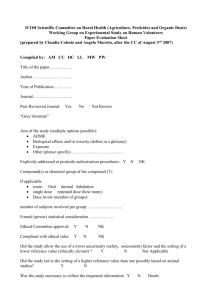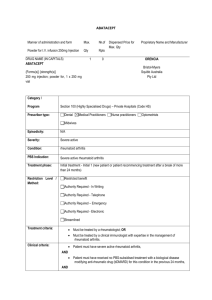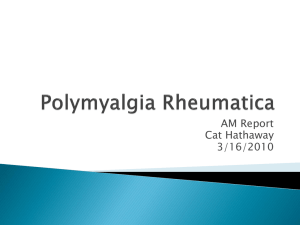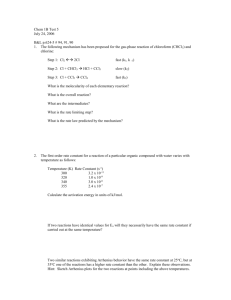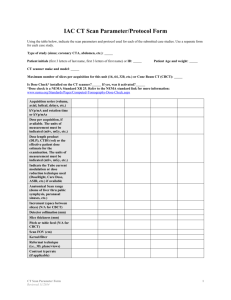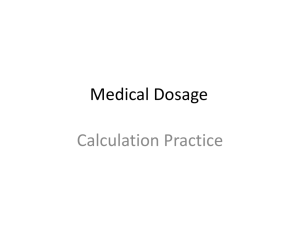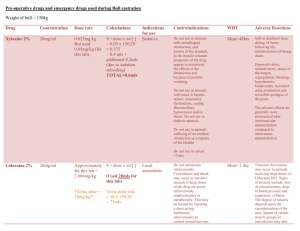Blood Monitoring Booklet - Pennine MSK Partnership
advertisement
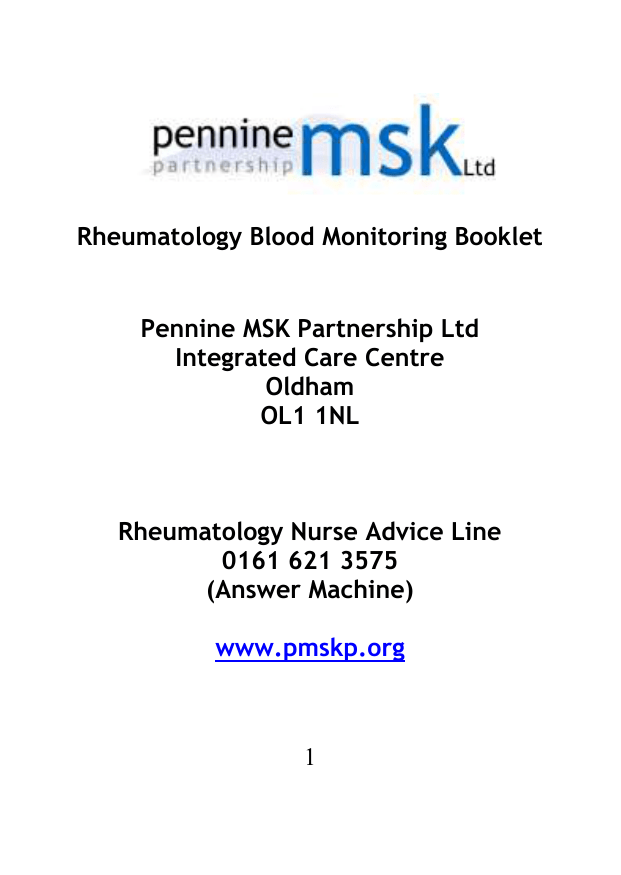
Rheumatology Blood Monitoring Booklet Pennine MSK Partnership Ltd Integrated Care Centre Oldham OL1 1NL Rheumatology Nurse Advice Line 0161 621 3575 (Answer Machine) www.pmskp.org 1 There are two sections to this booklet: Section 1 (pages 3-6) Useful numbers and information. Section 2 (pages 7-24) Helps you know about your treatment and what you need to understand about your blood tests and monitoring. 2 SECTION ONE USEFUL NUMBERS AND INFORMATION Name: _____________________________ Date of Birth:________________________ NHS Number:________________________ This booklet provides information on your blood tests, and is an important way of communicating information between the Rheumatology Service and your GP. Please ensure all blood tests are entered into this booklet and take it with you to all your appointments. It is your responsibility to organise the blood tests at your GP practice. 3 If you are unsure of when you have your blood test, please ring the Nurse Specialist or ask your GP. Blood monitoring is an important part of your treatment and helps us to know whether you are safe to continue on treatment. If you fail to have blood tests you are putting yourself at risk. 4 Contact Information NHS Direct Telephone: Website: 0845 4647 www.nhsdirect.nhs.uk Patient and Professionals Organisations Arthritis Care: Telephone: 0808 800 4050 Website: www.arthritiscare.org.uk Arthritis Research Campaign: Telephone: 0870 850 5000 Website: www.arc.org.uk National Rheumatoid Arthritis Society: Telephone: 0845 458 3969 Website: www.rheumatoid.org.uk Psoriasis Arthropathy Alliance: Telephone: 0870 770 3212 Website: www.paalliance.org 5 British Society for Rheumatology: Telephone: 0207 842 0900 Website: www.rheumatology.org.uk British Association of Dermatologists: Telephone: 0207 384 0266 Website: www.bad.org.uk and select ‘public information’ National Library for Health on skin conditions: Telephone: 0845 4647 Website: www.library.nhs.uk/skin The National Ankylosing Spondylitis Society: Telephone: 020 8948 9117 Website: www.nass.co.uk 6 SECTION TWO PATIENT HELD BLOOD MONITORING AND DOSAGE RECORD 7 Blood Monitoring Requirements There will be specific tests you will have to have and the tests will depend upon the Disease Modifying Anti-Rheumatic Drug (DMARD) you have been prescribed. See pages 21-23 if you would like to understand what each of the abbreviations below mean and what the test is checking. Methotrexate FBC, LFT’s, CRP & ESR every 2 weeks until dose of Methotrexate and monitoring stable for 6 weeks; then monthly thereafter. In some cases after a year of stable disease and dose of Methotrexate, the monitoring frequency may be reduced. U&E annually. Sulfasalazine FBC, LFT’s, CRP & ESR monthly for the first 3 months. Then every 12 weeks for 1 year, then every 6 months if dose and blood monitoring remains stable. 8 Leflunomide FBC, LFT’s, CRP & ESR every month for the first 6 months and if the dose and monitoring stable, every 2 months thereafter. BP and weight checked at each monitoring visit. U&E annually. Penicillamine FBC, LFT’s, CRP, ESR and urinalysis every 2 weeks. If stable for 3 months then the same tests monthly. U&E annually. Gold Injections FBC, LFT’s, CRP, ESR and urinalysis at time of injection (FBC once stable can be reviewed one month in arrears). Azathioprine FBC, LFT’s, CRP & ESR weekly for 6 weeks, then 2 weekly for 6 weeks until dose and monitoring stable. Then continue with monitoring monthly when dose is achieved and stable for 6 months – consider reducing to 3 monthly. 9 If you experience a rash, nausea, bruising, oral ulceration or any other potential side effects you should seek advice from the Rheumatology Advice Line. If you have any concerns regarding these blood tests / results, then please either consult the GP or ring the Rheumatology Advice Line. 10 Date of dose instruction Name of DMARD Dose and frequency of DMARD Date DMARD stopped and reason why Name of Clinician Drug History 11 Date of dose instruction Name of DMARD Dose and frequency of DMARD Date DMARD stopped and reason why Name of Clinician Drug History 12 Date of dose instruction Name of DMARD Dose and frequency of DMARD Date DMARD stopped and reason why Name of Clinician Drug History 13 Blood Tests Tests/Date Hb MCV WCC Platelets Neutrophils Lymphocytes ALT/AST Creatinine CRP ESR Urinalysis BP DAS/Disease Activity Score Steroids: Describe Route Dose Duration 14 Blood Tests Tests/Date Hb MCV WCC Platelets Neutrophils Lymphocytes ALT/AST Creatinine CRP ESR Urinalysis BP DAS/Disease Activity Score Steroids: Describe Route Dose Duration 15 Blood Tests Tests/Date Hb MCV WCC Platelets Neutrophils Lymphocytes ALT/AST Creatinine CRP ESR Urinalysis BP DAS/Disease Activity Score Steroids: Describe Route Dose Duration 16 Blood Tests Tests/Date Hb MCV WCC Platelets Neutrophils Lymphocytes ALT/AST Creatinine CRP ESR Urinalysis BP DAS/Disease Activity Score Steroids: Describe Route Dose Duration 17 Blood Tests Tests/Date Hb MCV WCC Platelets Neutrophils Lymphocytes ALT/AST Creatinine CRP ESR Urinalysis BP DAS/Disease Activity Score Steroids: Describe Route Dose Duration 18 Blood Tests Tests/Date Hb MCV WCC Platelets Neutrophils Lymphocytes ALT/AST Creatinine CRP ESR Urinalysis BP DAS/Disease Activity Score Steroids: Describe Route Dose Duration 19 What the terms mean It is common for people with long term (chronic) conditions to have blood results that may be slightly different from people who don’t have a chronic condition. For instance, people with Rheumatoid Arthritis are often slightly anaemic. So, although your treatment can cause anaemia (low haemoglobin), there may be other reasons related to your condition that should be checked with regular monitoring. Keeping results of your blood tests will help you to know what is ‘normal’ for you. When checking blood results the doctors and nurses are not only looking at ‘what is normal for you’ but also looking for any trends in the blood results that might change gradually over time. These gradual trends can be as important as the ‘normal values’ set out on the following page. 20 Full blood count (FBC) refers to a set of tests used to understand your current blood picture and will include Haemoglobin (Hb), White Cell Count (WCC) and Platelets (PLT). Term and normal value Hb Explanation Haemoglobin is the oxygen Male 13.5 – 17.5g/dl carrying protein inside red Female 12-16 g/dl blood cells. Low levels may show that you are anaemic MCV The average volume of a red 80-100fl blood cell. Two potential causes of large red blood cells are toxicity and a deficiency of folic acid. WBC White 4.0-11.0 x 100/l important blood cells in are fighting infections. The count can rise as a result of infection or from taking steroids. A low count may indicate toxicity. 21 Term and normal value Platelets Explanation Platelets are 150-400x109/l normal blood clotting. A low essential for count may indicate that your drug treatment is harming the bone marrow. Lymphocytes A type of white blood cell 1.5-4.0 x 100/l that has an important role in protecting your body from infections. Neutrophils A type of white blood cell 9 2.0-7.5 x 10 /l that usually increases quickly to fight infections. ALT ALT tests how your liver is Usually less that 50u/l working. levels Rising may inflammation. 22 blood indicate ALT liver Term and normal value Urea Explanation These are tests that help to 2.5-8.0 mmol/l (varies with show how your kidneys are age) working. You will normally and creatinine µmol/l 60-125 have these checked before you start treatment and from time to time (usually 3-6 months) when you are reviewed. CRP,ESR Indicators of inflammation which may be raised due to active disease or infection. Other tests Your doctor or nurse will explain the need for other monitoring tests which may be needed. 23 Other tests that may be requested There are some tests that me be required in addition to those outlined in your monitoring booklet. Some of these tests are to give the doctors and nurses caring for you additional information about your treatment, especially when the routine blood tests fall outside what is ‘normal for you’. Some of these additional tests include: Alkaline Phophatase This is a test that measures some liver, bone and stomach conditions. In many cases Alkaline Phosphatase will not be routinely recorded, as slightly raised levels are common. 24 25 Rheumatology Drug Information and Blood Monitoring Booklet [V5] Approved November 2010 / Review November 2012 26
